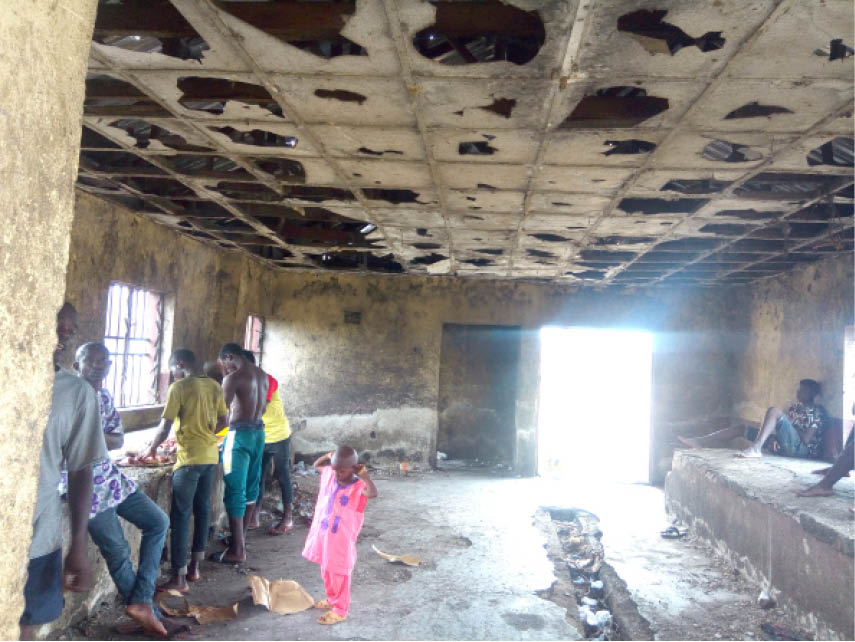Meat processed at Kuje’s abattoir worries residents
The unhygienic condition of the only abattoir in Kuje is causing concern to residents of the area, Aso Chronicle reports. “My major concern is the water butchers use in washing meat before taking it to the market. They use stagnant water to wash the meat. It is what discourages me from patronising cow meat,” Godwin […]

Inside the dilapidated abattoir in Kuje
The unhygienic condition of the only abattoir in Kuje is causing concern to residents of the area, Aso Chronicle reports.
“My major concern is the water butchers use in washing meat before taking it to the market. They use stagnant water to wash the meat. It is what discourages me from patronising cow meat,” Godwin Abbah, a resident, said.
Abbah blamed the area council’s authorities for not doing the needful to ensure hygiene at the abattoir.
He said the water the butchers used to wash meat was not hygienic “because we don’t know the source of the water. There is no doubt some people urinate and excrete in the stream which may result to cholera and other diseases. The butchers use the same water daily to wash meat.”
Apart from the dilapidated state of the abattoir at Shada Community in Kuje Area Council; which has become an eyesore, the unhygienic preparation of meat by butchers is what has been giving some of the residents a source of concern.
Aso Chronicle visited the abattoir on Saturday and observed that even as cows are being slaughtered in the open place, preserving the meat before it is conveyed to the market poses a big challenge.
It was observed that the meat is conveyed on head by the workers at the slaughter house to a stream. They wash it there before conveying to the market.
Apart from the old vehicle tyres the workers use in roasting some parts the cow: skin, head, tail and legs, they still use dirty water to wash them.
A cross section of residents who spoke with our reporter complained about the way the meat is being prepared, which they said was unhygienic and might pose health risks.
A house wife, Mrs. Halima Usman, said she always boiled meat thoroughly whenever she went to buy meat due to the kind of water the butchers used.
“What will one do, even when I later discovered that the water the butchers used is not clean? So anytime I go to the market to buy meat, I boil it very well after washing it with clean water,” she said.
Mrs. Florence Ade who operates a restaurant along Shadadi-Lanto Road in the area said she always visited the abattoir early to buy from the butchers and took it home to use clean water to wash the meat before she prepared the soup.
“Because of the problem of lack of water which they are facing at the abattoir, I always ask my customer to bring meat to me right from the slaughter house before they convey the remaining meat to the stream,” she said.
She added that the unhygienic water butchers used posed a serious health risk to consumers, and so she called on the authorities of the council to provide a borehole for the butchers.

Mr. Alfred James Bako, a resident of the area whose house is close to the abattoir, complained about the stench that always disturbs the neighbourhood.
Mr. Bako said he hardly stayed outside to take fresh air due to the stench, which he said posed a health challenge to not only himself, but the entire residents of the area whose houses are close to the slaughter house.
“If it is not now that rain has started dropping, you cannot sleep or rest outside your house due to the stench coming from the slaughter house,” he said.
Commenting, the Chairman of the butchers in Kuje, Alhaji Bala Sarkin Pawa, said the major problem they had been facing over the years was lack of potable water, saying the borehole with an overhead tank which supplied them water had broken down for years.
Alhaji Bala said, “And as you can see, even the slaughter house is in a dilapidated shape. Despite the N500 they collect from us for each cow we slaughter, we don’t have a clean and standard slaughter house. And we don’t also have potable water, as our people sometimes buy water from vendors or go to the stream to wash meat.”
The chief of the butchers also complained over encroachment on the land where the abattoir is located, saying a politician who claimed the land belonged to him had virtually sold the plot.
“In fact, it was during Sen. Wowo, when he was Kuje chairman, that he allocated this place to us and sank a borehole for us, but today, you can see that the place has been sold to some people by one councillor who claimed the land belonged to him, and so we now slaughter cows in the open,” he added.
A butcher, Mallam Aminu Garba, also described the slaughter room as “terrible,” which he said was unhygienic.
Mallam Garba identified lack of water, electricity and a bad road, which he said also posed a challenge to butchers, especially when conveying meat to the market.
“In fact, the abattoir has been in existence for a long time and has not been renovated at all,” he said.
He, therefore, appealed to the council’s authorities to build another abattoir and provide basic amenities that would promote the growth of meat business and standard of living in the area.
The Head of Department (HOD) for Environment and Sanitation of Kuje Area Council, Sani Mohammed, did not pick calls put across to him and he did not also reply to a text message sent to his phone.
